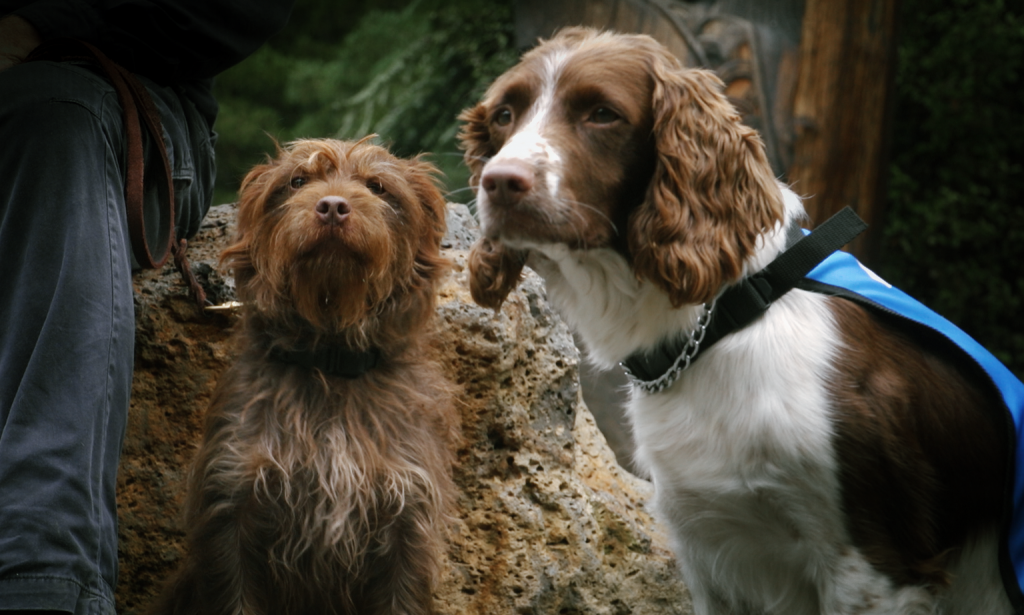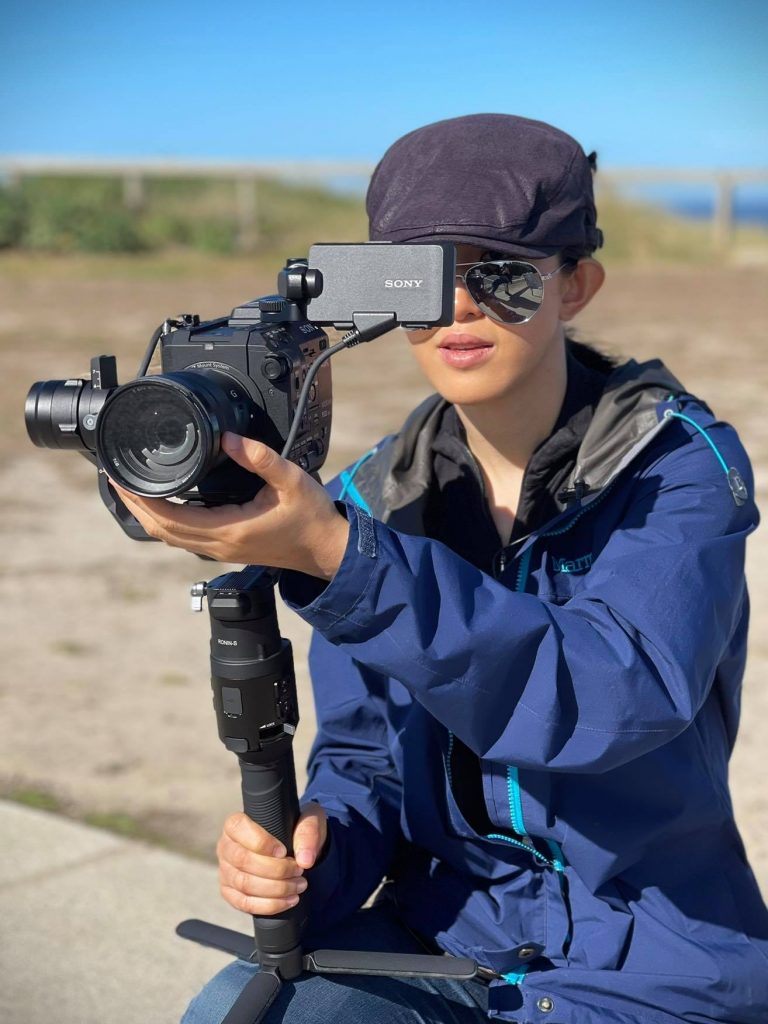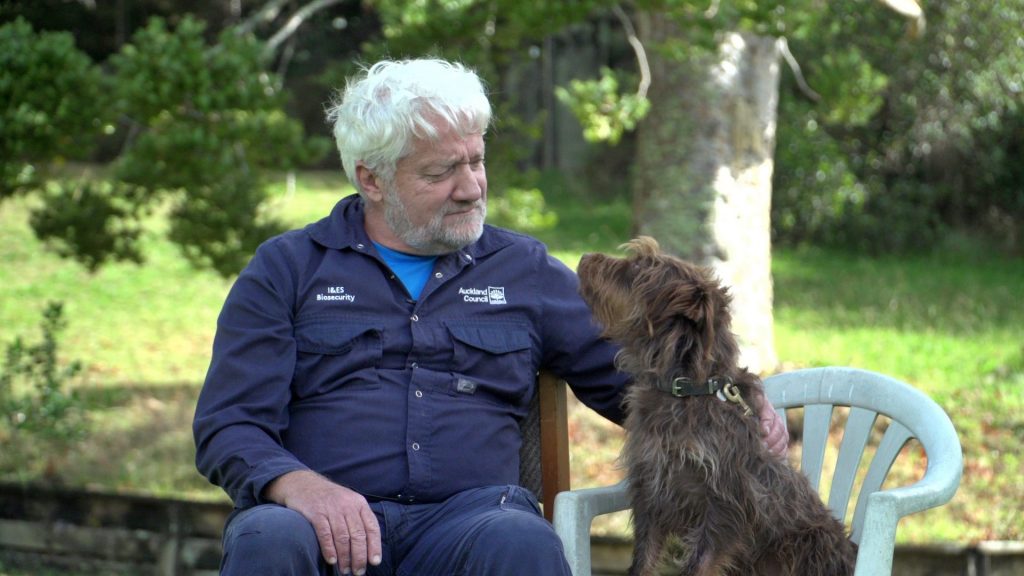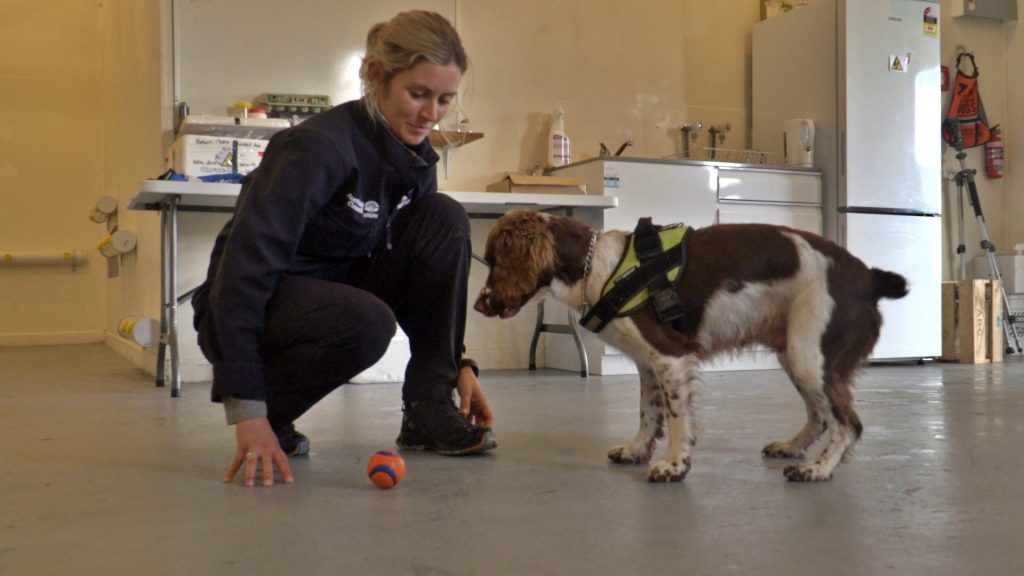Joy and synchrony: the making of Kauri K9s
At the end of June, Wen Qing Ng submitted her thesis for her Masters of Science Communication endorsed in Science and Natural History Filmmaking from Otago University. Wen Qing’s creative component involved producing a short film, introducing us to Mawhai and Pip and their role in reducing the spread of Phytophthora agathidicida and kauri dieback (KDB). Kauri K9s is not only a remarkable feat of documentary-making, but remarkable in the warmth and hope with which it conveys its message.

While Wen Qing leans towards the creative, all her life she has been fascinated by the systems and processes of science. Some of the more somber conventions of science communication have led her to search for other ways to tell stories. Through the Wild Dunedin Festival, Wen Qing had the opportunity to attend guided nature walks. One walk in particular (at Penguin Place) left a lasting impression.
“I observed how the guide (Adrian Foote) interacted with his participants, mostly children,” says Wen Qing. “It was so lovely, seeing them flocking around, listening to him so attentively.” Skipping over some of the less accessible, heavier science, Wen Qing says the guide communicated in a manner that pulled the tamariki in, with the accompanying adults listening just as keenly.
It suddenly clicked.
“This is the way I wanted to tell the story of my film.”
Wen Qing wanted her story to be woven with emotional resonance and warmth. From Sam Peacocke’s breathtaking drone footage of kauri forest, to Antonia Hoeta’s lyrical narration, to her own deft animation skills, Wen Qing’s optimistic perspective is apparent throughout Kauri K9s.

Another important consideration was the integration of elements of Te Ao Māori. The background music she used was composed using traditional Māori instruments.
“It’s like a heartbeat from deep within in the earth. I felt that conveyed the strength and grandness of the trees and the landscape itself very nicely. And so, when Antonia Hoeta’s voice comes in it all fits together.”
In reference to showbusiness, W.C. Fields coined the phrase ‘never work with children or animals’ — but when it came to filming the canine scent trainings depicted in her film, Wen Qing says she could feel the love between the trainers and the dogs.

“The training was tough, but I could feel how both trainer and dog worked in synchrony, and the joy that they both got afterwards. I wanted to show that it was all part of the process, both the hard and the light moments.”
Dog trainers Brian Shields and Kerryn Johnson (both biosecurity advisors for Auckland Council) shared a clear bond with Mawhai and Pip, which Wen Qing knew would capture audiences. “People love dogs,” she says. “They just incite such a joyful feeling.”

There were other challenges. Without a camera crew (due to COVID-19 restrictions), Wen Qing operated three separate cameras herself: two GoPros and one handheld camcorder. “Brian and Kerryn were super patient,” she says. “Aways forthcoming, always offering to accommodate additional shots.”
Additionally, footage needed to be captured within timed training schedules. “If [Mawhai and Pip] over-train they could be bored,” she says “Or their noses could tire. After a certain point the trainers wrap up, so I had to take into consideration these limitations.”
Kauri K9s came about when Wen Qing was asked by her research supervisor Dr. Fabien Medvecky to take on a project about kauri dieback (click here to read about Fabien’s role with the Ngā Rākau Taketake – Mobilising for Action team).
“Wen Qing really stood out in an introductory course I was teaching on Science Communication,” says Fabien. “I knew from discussions she had interest in the natural world, so when it came to finding a Masters Student for a project on kauri dieback, there was no question in my mind. Wen Qing was the one.”
In the undertaking of her research thesis, Wen Qing interviewed forest users about kauri dieback and the resulting restrictions. “I got to understand their frustrations and uncertainty,” she says, and she wanted her film to help “click together” the disjointed information they already held: how to recognise kauri dieback, how it spreads, what is being done to combat it.
“I wanted to show we are deriving benefits from the kauri, but sometimes unknowingly. When we save these trees, we save them for the community around us, for the children.”
Wen Qing points out that ngahere not only shape the physical landscape, but our community health. “When COVID-19 hit us, a lot of people went to the forest to destress, to take a break from everything.”
In the production of Kauri K9s, Wen Qing has demonstrated her technical prowess, an ability to integrate science communication with vivid stories from our communities, and a strong creative vision. BioHeritage wishes her the best for all her future pursuits.
Click here and scroll down to watch Kauri K9s
Award-winning documentary producer and National Geographic Explorer Dr. Gianna Savoie supervised Wen Qing’s creative thesis.
Wen Qing Ng’s research is funded by the Ngā Rākau Taketake research theme Mobilising for Action, in partnership with the University of Otago.
Written by Kerry Donovan Brown.
Posted August 2022.